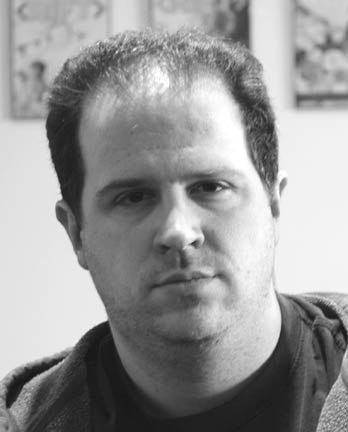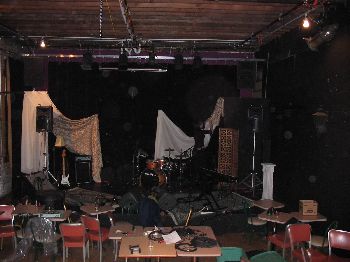Mix Tape: Experimental Music?
Rich Horton went looking for experiments and found the Acadia Cafe and the Cleophone.


So I was on a quest to find out who was doing something interesting and different musically in the Twin Cities. I originally thought I was looking to find what I termed “experimental music” but found out that “experimental” might be the wrong term.
A few bands or musicians that I looked up had slapped the term “experimental” onto the end of their descriptions of themselves. Their definition of the “experimental” part was that they slapped a sound collage on the end of a pop song. This seemed to miss the point.
So instead of experimental, we’ll go with the term “unconventional” and talk about events and music that break the formula of standard instruments and structured songs.
Free Improvised Music Night at the Acadia Café
An event that has been happening for about six years now, three of those years at the Acadia Café, is the Free Improvised music night every Tuesday. Not “free” as in “it doesn’t cost anything”: the cover charge is three dollars. Instead it’s “free” as in “you can do anything you want as long as it is completely improvised”: that you make it up as you go along and nothing was preplanned or pre-written.
Bryce Beverlin II is currently the man who books the acts; once in awhile he’ll step on stage to perform. He also runs Insides Music, a CDR record label that mainly does free music. Beverlin has done free improvisation with groups of musicians and also performed by himself.
One of the Tuesday nights I hit the Acadia to see what it was all about, John Devine, who founded the Imp Ork Orchestra, had brought in a group of members. The instrumentation was pretty standard, a few saxophones, trumpet, stand-up bass—but there was an Apple laptop, which does seem to make its way to plenty of stages these days, but not usually in what looks like a jazz setting.
Beverlin noted that this wasn’t a normal Tuesday night, usually filled by three or more groups; Devine had requested an entire evening. The music seemed like freestyle jazz, but some of the performers stretched out, pushed the limits of their instruments, hitting notes and noises that were sometimes uncomfortable. The cool thing was to see them hit stride– and then notice one musician wander off in his or her own direction and then find the way back to intertwine with the others.
On any given Tuesday night at the Acadia, the instrumentation can really vary. While standard instruments make their appearance, buckets, pots, pans, toys and homemade instruments can be part of the performance. Not all of the performers are musicians and dancers sometimes grace the stage. Some of the performers that have played Tuesday nights several times include Andrew Lafkas, Nathan Phillips, Charles Gillett, Jaron Childs, Milo Fine, Mike Hallenbeck, Tim Glenn, Davu Seru, Casey Deming, Jon Davis, Greg Schaefer and Alden Ikeda.
The audiences usually average around 15-25 souls, but sometimes the performers can end up playing for themselves. Other times, when a well-known local musician decides to play, the room can fill up. Andrew Broder of Fog brought in a pretty decent-sized crowd.
Beverlin notices that most of the audience tends to be other musicians. “People should come to check it out, see what it’s about,” he said. If your taste musically is mostly not out of the ordinary, it shouldn’t dissuade you from checking it out. “I listen to everything from Slayer to Stockhausen,” said Beverlin. Free improvisation is not a style of music to venture into if you’re interested in getting rich. Most performers, including Beverlin, also play other types of music and have a full-time job. Beverlin is also finishing up his higher education; creating music as art is his release.
If you’re interested in seeing music in a different state of mind, where a given combination of musical notes can be unprecedented, heard for the very first time ever, check out the Acadia on a Tuesday night.
The Cleophone
Dave Krejci was tweaking his Rhodes organ when the initial ideas came together for the Cleophone. He ordered some Rhodes pickups and stretched some piano strings across them on a board and messed around with it until he had something he could play. “I never had a serious intent to invent anything, it just kind of happened. It was winter in Minnesota and was a good way to spend late nights in the basement.”
He named the instrument after his daughter who after hearing it dubbed it “Scooby Doo Music.” But Dave wanted it to have her name, so the Cleophone was born.
Listen to the tracks on his website and you’ll agree with little Cleo: the sound would suit a haunted house. It’s sort of noisy moan, with ambient noises clinking and clicking. Since the noises of the Cleophone aren’t really musical, but “interesting sound,” its audience tends to be other musicians—people who collect sound, for whom sound is raw material. “The Cleophone is purely a sonic thing. No words to hold on to. No melody. It’s just a thing that makes sound. More often than not, it’s only a musician that considers that worthwhile,” said Krejci.
Krejci also plays in a rock trio, so he does get to enjoy both experimental sound and the more traditional rock music side of things. “I have always enjoyed both, equally. To do just one gets very boring for me. It’s a ‘there is not light without dark, no heavy without light’ sort of thing. I will always do both,” he notes. What he listens to musically is diverse as well, and you can find a correlation between what’s on his Ipod and the music he plays: “I like Black Sabbath as much as Ornette Coleman. My iPod collection looks like it was created by two distinct individuals.”
While Krejci admits he knew the Cleophone wouldn’t be popular in a traditional sense, he does feel conflicted when playing in front of smaller audiences.
“I struggle with caring too much sometimes. Yes, it matters, because it makes it a lot more intense when I play before a crowd of people. The energy in the room is a lot higher, no doubt about it. So, when I play a Cleophone show in front of seven people, I do feel disappointed because it is a bit of a lost opportunity. However, nothing I’ve ever done has been wildly popular. Bottom line, though, is that no matter how few people listen or come to see me play, it will never influence what I’m playing. So, in that sense, it doesn’t matter. I play because I love it, not because I want to be loved,” said Krejci.
The Cleophone, however, isn’t invisible to fans. There have been over 2,000 downloads of the Cleophone podcasts on his website. “It’s thrilling to know I can go to my little basement studio, record some random music, post it online, and have people actually listen. It’s like playing in front of that big audience, but doing it in solitary confinement,” said Krejci.
Krejci is now releasing the first real CD recording of the Cleophone, which will be available in the middle of August. It is comprised of one 33-minute song, and entitled “The Cleophone.” You can get it from the link below.